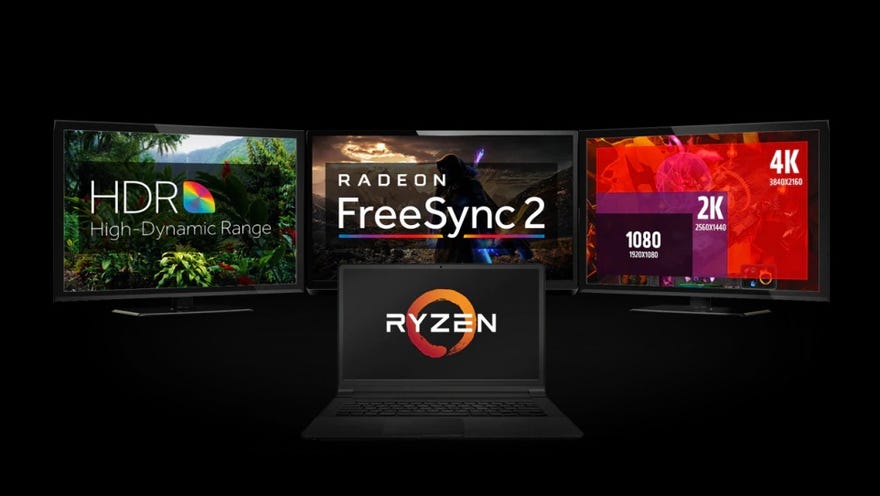CES 2019: AMD's new Ryzen 3000 H CPUs pave the way for high-end gaming laptops
Ryzen to the occasion
Eager to kick off 2019 with a bang, AMD have announced a slew of new 2nd Gen Ryzen+ CPUs for laptops ahead of this year's annual tech bonanza, CES. The seven-strong Ryzen 3000 series will cover everything from ultra thin notebooks to high-powered gaming laptops, and every CPU will come with one of AMD's Ryzen Vega graphics chips to boot. Here's the lowdown on everything you need to know.
Traditionally, AMD have never made much of a foray into the land of gaming laptops, but all this is set to change with the introduction of their new Ryzen 3000 H series. There will be two such processors to start with - the quad-core 2.1GHz Ryzen 5 3550H and the quad-core 2.3Hz Ryzen 7 3750H - and both have a TDP or thermal design point of 35W, giving them a lot more power to play with than the 15W offerings in AMD's new ultra thin laptop processor line-up (more on that in a sec).
As mentioned above, both Ryzen 3000 H chips will also come with onboard Vega graphics (eight Vega cores for the Ryzen 5 and ten for the Ryzen 7), but it's unlikely you'll need to take advantage of them when both chips are destined to be paired with AMD's more powerful dedicated graphics chips. One of the first Ryzen 3000 H series laptops that's going to be available, for example, is the Asus TUF Gaming FX505DY, which comes equipped with a 4GB RX 560X card and either a 15in 1920x1080 120Hz FreeSync display or a regular 15in 1920x1080 60Hz screen.
Of course, with this still being a new-ish area for AMD, don't expect there to suddenly be dozens of Ryzen 3000 H-based laptops up for grabs. Indeed, AMD themselves have admitted they're still testing the water in this respect, but I'll keep you updated if any more Ryzen 3000 H laptops are announced over the next couple of days.
Moving on to much more familiar ground, AMD's 3000 series line-up for ultra thin laptops spans five new processors that range right down their entry level Athlon series all the way up to their powerful Ryzen 7 family. To see how they stack up against their H series cousins, here's a nice table of specs and numbers for you to peruse:
| CPU | Cores / Threads | TDP | Base / Boost Clock Speed | Vega Cores | GPU Clock Speed |
|---|---|---|---|---|---|
| Ryzen 7 3750H | 4 / 8 | 35W | 2.3GHz / 4.0GHz | 10 | 1400MHz |
| Ryzen 7 3700U | 4 /8 | 15W | 2.3GHz / 4.0GHz | 10 | 1400MHz |
| Ryzen 5 3550H | 4 / 8 | 35W | 2.1GHz / 3.7GHz | 8 | 1200MHz |
| Ryzen 5 3500U | 4 / 8 | 15W | 2.1GHz / 3.7GHz | 8 | 1200MHz |
| Ryzen 3 3300U | 4 / 8 | 15W | 2.1GHz / 3.5GHz | 6 | 1200MHz |
| Ryzen 5 3200U | 2 / 4 | 15W | 2.6GHz / 3.5GHz | 3 | 1200MHz |
| Athlon 300U | 2 / 4 | 15W | 2.4GHz / 3.3GHz | 3 | 1000MHz |
As for how these compare to the competition over at Intel, AMD have only released figures for their mid-range Ryzen 5 3500U so far, claiming it's 14% faster than Intel's Core i5-8250U at web browsing, 27% faster at media editing and roughly the same when it comes to productivity applications such as Microsoft Office. That's not bad, all things considering, but with Intel yet to unveil their inevitable crop of 9th Gen Coffee Lake mobile processors, these figures may feel considerably less impressive by the end of the week.
Still, with up to 12 hours of battery life (or 10 hours of video playback) and support for 4K resolutions as well as HDR, there's a lot to like here, especially when the presence of those all-important Vega GPU cores means every 3000 U series CPU will be able to do a spot of light gaming as well. Of course, don't expect them to be able to play the latest and greatest games out there - you'll need a proper gaming laptop for that sort of thing - but less power-hungry past times should still be just about doable provided you don't mind making some rather large compromises.
For instance, AMD claim the Ryzen 7 3700U can achieve an average of 87fps in Rocket League (albeit on Low quality settings at 720p) versus the 73fps average you might get on Intel's Core i7-8565U, as well as 57fps in Fortnite (also on Low at 720p) as opposed to 48fps on its Intel rival.
Sure, those figures aren't going to blow you away with their shining, graphical majesty, but it's still handy to have a teensy bit of gaming grunt if you need to while away a few hours on a train or fancy a match of something while you're sitting in a hotel room, for example. What's more, starting from sometime between January and March 2019, all future AMD Radeon Software updates will include support for every 3000 series CPU, giving you optimised performance no matter what device you're playing games on.
That's all for AMD mobile processors at the moment. There's no word yet on exactly when we might start seeing these chips make their way into this year's crop of gaming and ultra thin laptops, but I'll be poking my nose around AMD's CES 2019 booth later this week to find out more.
For more news and hands on previews from this year's CES, check out our CES 2019 tag.









